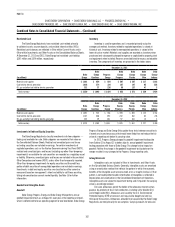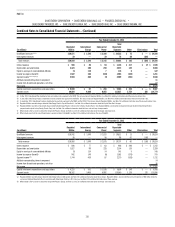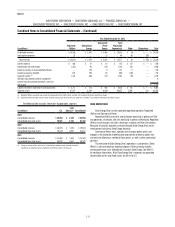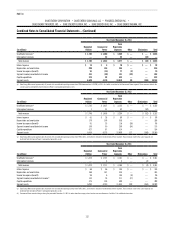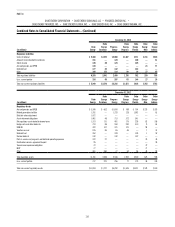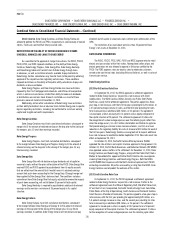Duke Energy 2013 Annual Report Download - page 124
Download and view the complete annual report
Please find page 124 of the 2013 Duke Energy annual report below. You can navigate through the pages in the report by either clicking on the pages listed below, or by using the keyword search tool below to find specific information within the annual report.
106
PART II
DUKE ENERGY CORPORATION • DUKE ENERGY CAROLINAS, LLC • PROGRESS ENERGY, INC. •
DUKE ENERGY PROGRESS, INC. • DUKE ENERGY FLORIDA, INC. • DUKE ENERGY OHIO, INC. • DUKE ENERGY INDIANA, INC.
Combined Notes to Consolidated Financial Statements – (Continued)
through increasing income taxes payable, reducing income tax refunds
receivable or changing deferred taxes.
Tax-related interest and penalties are recorded in Interest Expense and
Other Income and Expenses, net, in the Consolidated Statements of Operations.
See Note 22 for further information.
Accounting for Renewable Energy Tax Credits and Grants
When Duke Energy elects either an ITC or a cash grant on wind or solar
facilities, it reduces the basis of the property recorded on the Consolidated
Balance Sheets by the amount of the ITC or cash grant and, therefore, the ITC or
grant benet is recognized through reduced depreciation expense. Additionally,
certain tax credits and government grants received provide for initial tax
depreciable base in excess of the book carrying value equal to one half of the
ITC or government grant. Deferred tax benets are recorded as a reduction to
income tax expense in the period that the basis difference is created.
Excise Taxes
Certain excise taxes levied by state or local governments are required to
be paid even if not collected from the customer. These taxes are recognized on a
gross basis. Otherwise, the taxes are accounted for net. Excise taxes accounted
for on a gross basis as Property and other taxes in the Consolidated Statements
of Operations were as follows.
Years Ended December 31,
(in millions) 2013 2012 2011
Duke Energy $ 602 $ 466 $ 293
Duke Energy Carolinas 164 161 153
Progress Energy 304 317 315
Duke Energy Progress 115 113 110
Duke Energy Florida 189 205 205
Duke Energy Ohio 105 102 109
Duke Energy Indiana 29 33 31
On July 23, 2013, North Carolina House Bill 998 (HB 998) was signed
into law. HB 998 repeals the utility franchise tax effective July 1, 2014. The
utility franchise tax was 3.22 percent gross receipts tax on sales of electricity.
The result of this change in law will be an annual reduction in excise taxes
of approximately $160 million for Duke Energy Carolinas and approximately
$110 million for Duke Energy Progress. HB 998 also increases sales tax on
electricity from 3 percent to 7 percent effective July 1, 2014. HB 998 requires
the NCUC to adjust retail electric rates for the elimination of the utility franchise
tax, changes due to the increase in sales tax on electricity, and the resulting
change in liability of utility companies under the general franchise tax.
Foreign Currency Translation
The local currencies of most of Duke Energy’s foreign operations have
been determined to be their functional currencies. However, certain foreign
operations’ functional currency has been determined to be the U.S. Dollar, based
on an assessment of the economic circumstances of the foreign operation.
Assets and liabilities of foreign operations whose functional currency is not
the U.S. Dollar, are translated into U.S. Dollars at the exchange rates in effect
at period end. Translation adjustments resulting from changes in exchange
rates are included in AOCI. Revenue and expense accounts are translated at
average exchange rates during the year. Gains and losses arising from balances
and transactions denominated in currencies other than the local currency are
included in the results of operations when they occur.
Dividend Restrictions and Unappropriated Retained Earnings
Duke Energy does not have any legal, regulatory or other restrictions on
paying common stock dividends to shareholders. However, as further described
in Note 4, due to conditions established by regulators in conjunction with merger
transaction approvals, Duke Energy Carolinas, Duke Energy Progress, Duke
Energy Ohio and Duke Energy Indiana have restrictions on paying dividends or
otherwise advancing funds to Duke Energy. At December 31, 2013 and 2012, an
insignicant amount of Duke Energy’s consolidated Retained earnings balance
represents undistributed earnings of equity method investments.
NEW ACCOUNTING STANDARDS
The new accounting standards that were adopted for 2013, 2012 and
2011 had no signicant impact on the presentation or results of operations,
cash ows or nancial position of the Duke Energy Registrants. Disclosures
have been enhanced to provide a discussion and tables on derivative contracts
subject to enforceable master netting agreements and a table of quantitative
disclosures about unobservable inputs. See Notes 14 and 16 for further
information.
There are no Accounting Standards Updates that have been issued but not
yet adopted as of December 31, 2013, that are expected to signicantly impact
the presentation or results of operations, cash ows or nancial position or
disclosures of the Duke Energy Registrants.
2. ACQUISITIONS, DISPOSITIONS AND SALES OF OTHER
ASSETS
ACQUISITIONS
The Duke Energy Registrants consolidate assets and liabilities from
acquisitions as of the purchase date, and include earnings from acquisitions in
consolidated earnings after the purchase date.
Merger with Progress Energy
On July 2, 2012, Duke Energy completed its merger with Progress Energy,
a North Carolina corporation engaged in the regulated utility business of
generation, transmission and distribution and sale of electricity in portions of
North Carolina, South Carolina and Florida. As a result of the merger, Progress
Energy became a wholly owned subsidiary of Duke Energy.
The merger between Duke Energy and Progress Energy provides increased
scale and diversity with potentially enhanced access to capital over the long
term and a greater ability to undertake the signicant construction programs
necessary to respond to increasing environmental regulation, plant retirements
and customer demand growth. Duke Energy’s business risk prole is expected
to improve over time due to the increased proportion of the business that is
regulated. Additionally, cost savings, efciencies and other benets are expected
from the combined operations.








